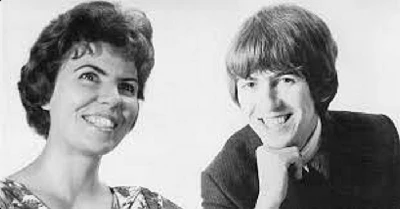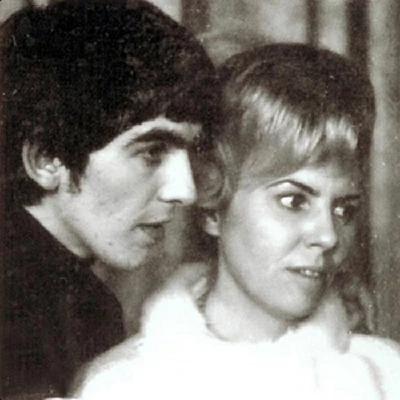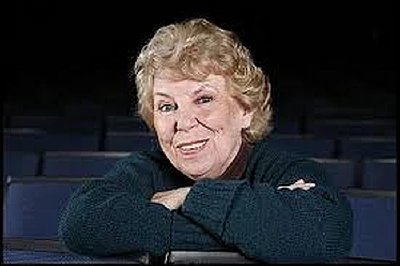published: 18 /
4 /
2015

Lisa Torem speaks to Louise Harrison, the older sister of George Harrison, about the Beatles tribute band which she manages and her recent memoir
Article
She “got roped into being Florence Nightingale” when on February 9, 1964, her younger brother, George, came down with a high temperature and strep throat prior to the Beatles’ appearance on ‘The Ed Sullivan’. Louise Harrison made sure her younger brother took his meds and nursed him back to health as much as humanly possible. “Lou” Harrison has had a long tradition of spreading kindness, pitching in and being there at the right time.
She grew up in Liverpool, the daughter of Harold and Louise and sister to Harry, Peter and, of course, George, whose career she would enthusiastically promote. As Louise had married an engineer and relocated to Illinois, George Harrison became the first Beatle to step on American soil.
Louise met Marty Scott around 2001 shortly after her brother died. They bonded quickly. Marty had already been a veteran of Beatles’ tribute bands, looked remarkably like her sibling, had a quick wit and plenty of charm. Around 2006, Louise would help form and then become manager of the Liverpool Legends, a Beatles Tribute Band. Marty would portray George and the other three members would also depict their chosen Beatles, donning period haircuts and fashions and adapting their mannerisms to a tee.
Scooped up by a theatre in Branson, Missouri, they would go on to win numerous Best Band awards. In 2012, the CD, ‘Fab Four Memories’, would receive a Grammy nomination.
They also built up an international following, filling venues like Carnegie Hall to Pasadena’s Rose Bowl to Liverpool’s Cavern, with a recent outpour of fans in Mexico City spilling out into the streets.
Louise describes her affection for the Liverpool Legends this way, “I grew up with three brothers so it’s like having a bunch of brothers to hang out with, which I enjoy. I’ve always said that, if my brother was still here on the planet, they’re the kind of guys that he’d like to be jamming with in the evening after the show.”
Louise participated fully in New York’s 50th anniversary of the Beatles’ first appearance on Sullivan last year and remains proud to be an important link to George Harrison’s legacy. She has also penned a memoir, ‘My Kid Brother’s Band’, which highlights her business practices, childhood stories and musical anecdotes.
Louise Harrison spoke to Pennyblackmusic about her personal history, the Beatles, her work with the Liverpool Legends and what her future holds.
PB: How did you first meet Marty Scott?
LH: I met Marty Scott just after George died, actually, and I always kind of jokingly say that wherever my brother went to, after he left the planet, that he had to look around to find a likely-looking George to substitute for him. Right when I first met Marty, we immediately adopted each other as brother and sister, and it’s been that relationship ever since.
PB: He does bear a remarkable likeness. I think the other wonderful thing about the band is that there is playfulness in the way that they perform.
LH: That’s what I told them, right from the get-go. The Beatles never ever took themselves seriously. They took their music seriously. They wanted to do the best possible job that they could, but as far as being onstage and some silly little thing happened, maybe a string on the guitar broke or one of the amplifiers went out, they would just laugh and keep on going. So, I told the guys that in the Liverpool Legends that things happen that interrupt the perfection of things, just take it in your stride, just laugh, just carry on. Treat it with humour and don’t get all bent out of shape. So, that’s what they’ve always done.
The Beatles never ever got to the point where they were, like, “Oh, my god, what’s happening?”
Even at the Shea Stadium, there was so much noise going on in the audience that at one part of the show, two of them were singing one song and the other two were singing something else. That didn’t faze them. They just said, “Let’s carry on.”
PB: What are the comments you generally get from audiences that see the Liverpool Legends?
LH: What’s been happening for the last fifteen years when I speak with fans is invariably they have a particular incident in their lives that’s connected them with the Beatles. For instance, maybe somebody who had a really, really bad illness and they’ll say, to me, that the only thing that really kept me going was being able to play my Beatles music all the time to keep me cheered up. I’ve heard many, many types of stories about what influence the Beatles music has had on their lives and I talk about a number of them in my book as well, but the thing about it is, for almost everybody that I meet at these shows, there is some special significance in their lives connected with the Beatles. The feeling that I get after all of these years of listening to these stories is that it’s really wonderful to be connected to something that has had so much of a positive effect on so many people all over the world. I feel it’s a great privilege to be part of the family that has brought all of those positive vibes all across the world.
Wherever I go, when people know that I’m George’s sister, I’m always greeted with love in their eyes. And one of the things that my mum said to me when the Beatles first started to come to the United States was that it was up to us as the biological family to return the love, to give back the love. So, that’s been basically my role in life ever since the whole thing started, was showing the family’s love back to the fans.
My mum was kind of the mum of the global family of Beatles. She was even the mum to both John and Paul in their teens, because they both lost their mothers and so between John, Paul and George, she was the only mum they had, and then she basically developed into the mum and the dad of the whole family of Beatles people all over the world. Mum and Dad Harrison used to write all of these letters and sign them, ‘Mum and Dad Harrison.’ So the kids all over the world, who are now adults and seniors, have always considered them to be a mum and dad to them. And I’m now considered to be the global mum.
PB: The Liverpool Legends are experts in the Beatles repertoire, but what material is most requested?
LH: Basically, we try to stick to the most general well-known music when we’re doing these shows.
PB: You’ve lived in a number of places and are currently living in California. What has it been like being away from England all of these years?
LH: I don’t know. Wherever I am, I just obey the laws and pay my taxes and try to be friendly and kind to people, so it really doesn’t matter which part of the planet I’m on.
PB: You sound amazingly busy promoting the band and your memoir right now. Do you have any free time at this point? And if so, is there anything you currently do that is not band or book related?
LH: I wouldn’t know what to do with free time (Laughs) if I had it. In fact, somebody said to me, ‘”How are you enjoying your hiatus in California?” I said, “Which hiatus?” Because I’ve been working harder here than I have anywhere else. I’ve got music producers talking to me about doing a documentary on that first year in 1963 when I was doing all that slugging around, trying to get the Beatles music played. So, since that’s a part of the Beatles history that nobody has ever heard of, there are people interested in getting that out there before I do leave the planet.
PB: How does the Liverpool Legends show contrast from performance to performance?
LH: Each show is different. Last weekend in Mexico City, the show was sold out before we got there and there were sixteen thousand people. So I always tell people, if you want to see the Liverpool Legends close enough to drive there or fly there, to get your tickets early because many, many times when they’re on the road, the shows are sold out before the actual day of the concert. So, if people are wanting to go, get your tickets as fast as you can.
We’ve had times when on the night of the show, people will be coming into the theatre and told, “Sorry, it’s sold out.” And they’ve gotten themselves dressed up and they’ve got their kids with them to see the show and they can’t get in. So, it’s important to get your tickets ahead of time.
PB: Do you tour with a large entourage? The band looks so authentic with period clothing and hairstyles and vintage instruments that I imagine require a lot of care.
LH: We have a couple of tech people that look after the equipment and help us set up the stage and we have somebody doing the lighting. It’s basically about ten of us all-together.
PB: How long do you think it took each member to be able to physically and musically depict his
Beatle? The mannerisms are uncanny.
LH: Well, I don’t know. Most of them were already playing Beatles before I met them, in particular, the guy who plays John. To me, even when he’s not playing John, he’s like John. I’m constantly calling him John because I can’t think of him as his other name. I think of him as John.
PB: I recently read the book, ‘Dreamweaver’ by songwriter Gary Wright. George and Gary were close personal and professional friends/colleagues who shared a strong bond of spirituality. Gary went into great detail about George’s spiritual leanings. How did you feel about George’s philosophies?
LH: Well, that’s basically what we grew up with, with my dad. See, that’s one of the reasons that I wrote a book because nobody realises that the spirituality was part of our growing up. It wasn’t something that just suddenly happened when George got to a certain age. It was part of his entire life, to understand that the living part of us is the creator and we’ve always believed that, so it wasn’t like all of a sudden he suddenly became spiritual. It was part of his life from the beginning.
That’s why I wrote the book really. Everybody has such affection for him and they respect the spiritually but they don’t realize that where it all came from was my parents.
PB: How would you describe that spirituality? Was it derived from a particular religion or would you describe it as a more freethinking philosophy?
LH: It was more of a freethinking…well, my mum was brought up as a Catholic so she was into the brainwashed thing of organised religion. My dad didn’t have much respect for organised religion because, as we know today, the worst thing about organised religion is that it causes everybody to be wanting to kill the ones that are in a different organised religion.
It’s been the beginning of the whole reason why so much of the planet has been fighting each other ever since we became humans and so my father didn’t go too much for that. He believed if we believed in the spirit, that the living part of us is part of the creator, that the creator put a drop of itself in each of us and respected that and tried to do the best that we could with whatever abilities we were given and always to be kind to other people and other creatures on the planet - then we’re doing the right thing, so that’s kind of how we were brought up.
PB: Were there additional factors that led you to write ‘My Kid Brother’s Band?’
LH: Well, actually, it was the guys in my band that said “You’re in your eighties now. You ought to at least let people know some of what you did in your life before you leave the planet” (Laughs).
One of the things I did in 1963 I was very, very instrumental in helping Brian (Beatles manager, Brian Epstein - LT) in England and George Martin and Dick James to understand what was going on in this country as far as how to get the music business on your side.
They were all English and, obviously, so was I, but I had been living in Canada and South America. I came to the US in 1963, and my mum started sending me all of their singles, and being a bit of a ham myself, I started going on the radio stations and saying, “Hey, this is my kid brother’s band in England. They’re number one and you should be playing them.”
I ran into all kinds of challenges trying to do that and I started getting all of the magazines: ‘Variety’ and ‘Cashbox’ and ‘Billboard’ to learn more about the music business, and the first thing, when I wrote to Brian Epstein, was to tell him that without the support and the backing of a major record label there was not much chance of getting your stuff played nationally because in England if you get played on the BBC, that’s all you need, that’s the entire country covered, but in this country - back then there were about 6,000 radio stations and there’s a lot more now -but back then, in order to get national coverage, you had to have one of the major record labels, which back then was Columbia, RCA or Capitol to put their heft behind you, their support behind you and so I started writing to Brian, telling him every week what was going on in this country.
I said, “You know you need to get with one of the major record labels,” and I discovered that Capitol was part of EMI and they were with EMI in England and I said, “Try to go after Capitol” and he did. He tried several times to get Capitol to take them on and Capitol kept turning him down, but eventually they did and they decided to put some money behind it and at that point, of course, it all started to take off.
But those were the things that I was telling the people in England, that you need to have something substantial—it wasn’t a matter of just simply having talent and being able to be recognised, you also had to have a considerable amount of money behind you and that’s still true today. Without money in this country and without somebody thinking they can make a profit out of you, you don’t get anywhere.
PB: What do you see happening with your career and with the Liverpool Legends over the next few years?
LH: All of the money I make from the book is going to go into a Family Trust so that when I leave the planet, I’ll leave a little bit of something for my family.
We’ve got a non-profit that we’re just forming to be able to continue with our work, helping raise money for the high school music departments, which is something we’ve been working on quite a bit, and we’re hoping to be doing more of that with some financial support because it’s very, very expensive putting on a concert, and if you’re trying to give the money that you raise to somebody else, it’s tough if you don’t have any financial support. So with the non-profit, we’re hoping to be able to have people support us on that.
Our guys do write some of their own original music and I have some opportunities on that and I’m also hoping that eventually my book will start selling and then, as I say, there are people wanting to work on a documentary and there are tons and tons of things happening.
When I lived in Sarasota, Florida, I had a friend and one of our favourite jokes that we used to make, was kind of a Monty Python remark, ”Oh, how I long for a dull moment.” Somebody once said, “You guys never seem to have a dull moment,”’ and we said, “No, we don’t. How we long for a dull moment.”
PB: Thank you.
Have a Listen:-
Picture Gallery:-

